LD
When it comes to dynamic duos, it's often the figure lurking in the shadows who captures my imagination—the Munger over Buffett, the Woz over Jobs, the Lotta over Demna, and, of course, the Larry David over Jerry Seinfeld.
Perhaps it's because those who work behind the scenes are less tethered to the trappings of fame and fortune, allowing them to speak with a freer candor. Or perhaps it's because those content to play the role of the right hand are genuinely interested only in the craft that captivated them from day one, unwavering in their dedication over the years, even as their counterpart becomes increasingly enraptured by everything else but the craft. The essence of teamwork, after all, lies not in compatibility but in sacrifice.
And it is for these reasons that I find myself drawn more to Larry David, the master of the understated. Sometimes I wonder if the my affliction to such figures is less about being my personal will and more about an inevitable acceptance—such as “this is who I am and these are my people”. So when the final episode of "Curb Your Enthusiasm" aired last night, I couldn't help but ponder the significance of its conclusion.
A work spanning twenty-four years offers too much to unpack, making it nearly impossible to summarize in a single body of text. When the first season premiered, I was still in middle school in China, completely unaware of who Larry David even was. Back then, the staple show for learning English in China was "Friends." Though I disagree that "Friends" is a dumbed-down version of "Seinfeld," they certainly don't occupy the same realm. Many of the lines from "Seinfeld" remain lost in translation to Mandarin, despite my many failed attempts to explain how funny they show is to my parents if only they could get the joke. In some way a good joke is not dissimilar to fashion - it only makes sense to a certain period and place, people and circumstance. The efforts to explain it are often futile, ending up ruining the whole meal. Also much like fashion, the relationship between Seinfeld and Curb only reminds me of Jun Takahashi’s 2004 Undercover collection, where he sent down pairs of models who looked like twins down the runway, one in “normal” clothes whereas the other wears the same thing, except it looks like it was dripped in acid. Curb is Seinfeld on acid.
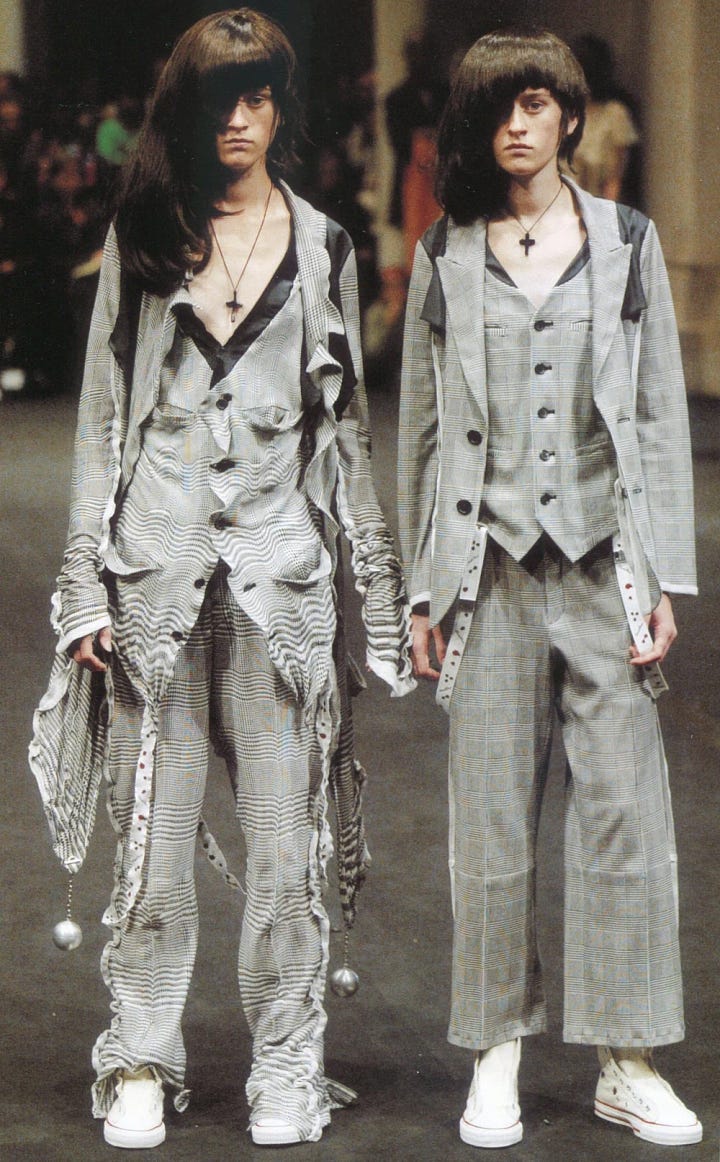
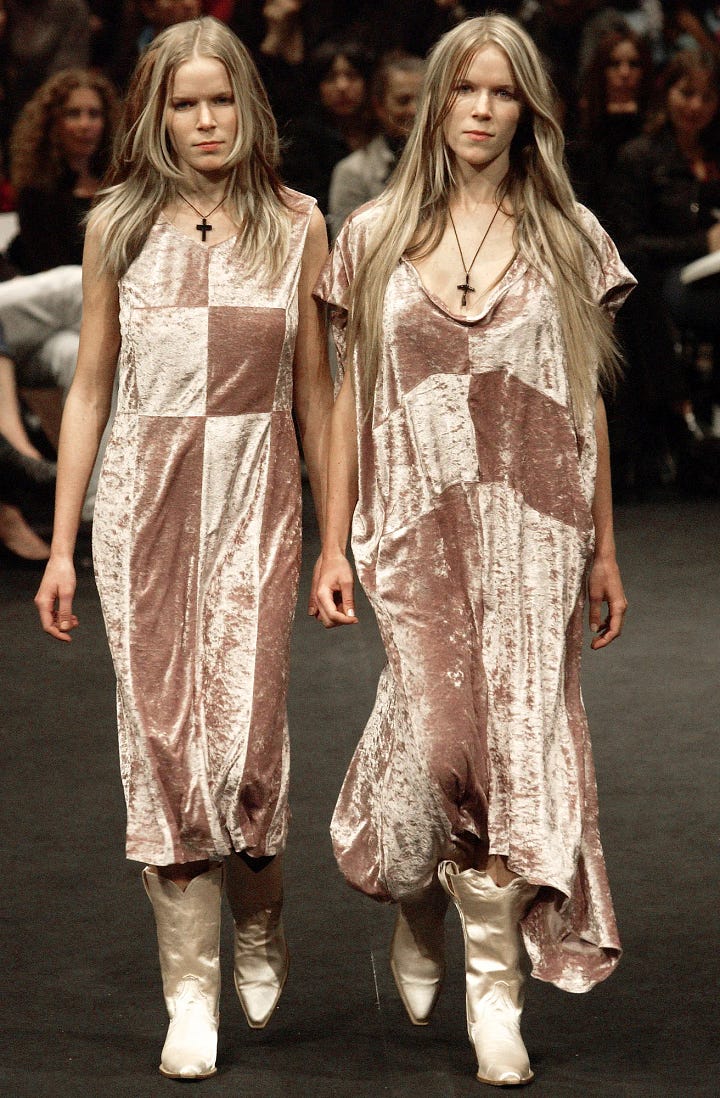
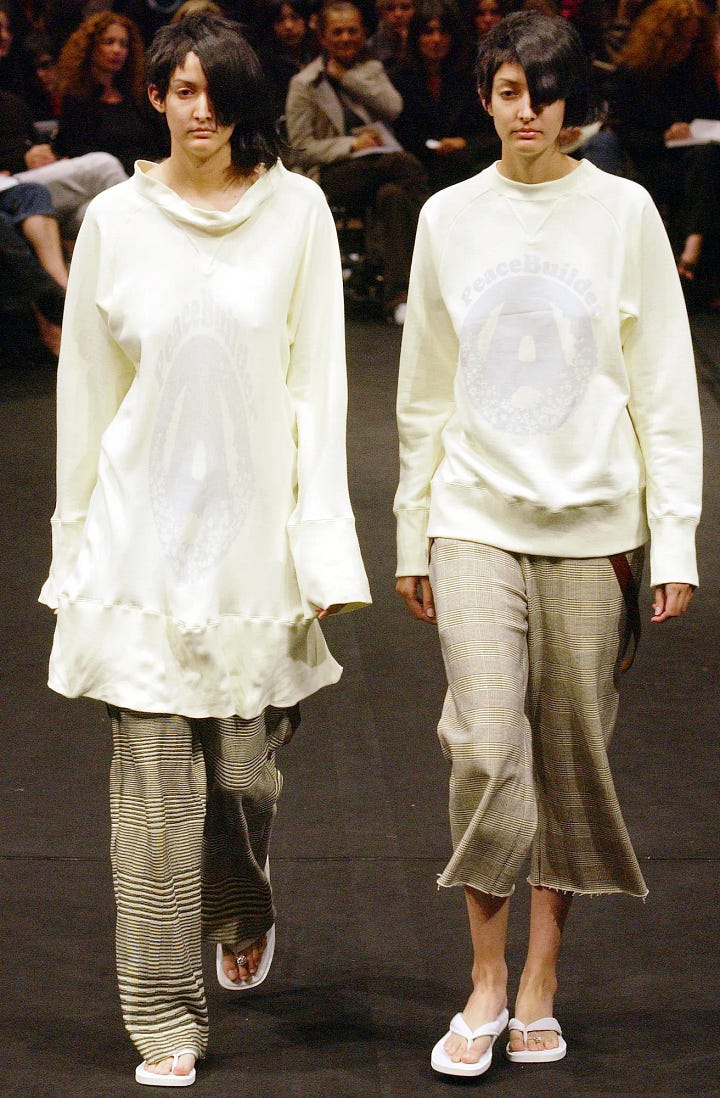

I sometimes wonder if Larry David, when he embarked on the first season, ever envisioned still filming this faux docu-series, nestled within the crevices of the cinematic landscape twenty years later. For Jerry, "Seinfeld" ended at the perfect time from the perspective of a television show, leaving countless fans nostalgic and wistful. In "Curb Your Enthusiasm," Larry steps out from behind the curtain, transforming to to a much slimmer, wealthier version of George Costanza — from J.Crew to James Perse, from a crummy New York apartment to Santa Monica mansion. And with the help of Seinfeld syndication checks, Larry in "Curb" still gets into the same trouples of George, but often gets out by paying someone to make it go way. Money can't solve everything, but it certainly greases the wheels on Curb.
I wonder if the audience of a film or television series can be categorized like the tiered membership of a department store, but as someone who has watched each episode at least ten to twenty times, discovering nuances that escape those who only watch once or twice, I'm constantly surprised I still catch things I didn’t notice times before.
Since this is a newsletter where fashion is my Trojan Horse, I would be remiss not to discuss the wardrobe of "Curb," not only Larry's attire but the outfits of the entire cast. First is one’s aesthetic choice; second is one’s value system. Through all twelve seasons, Larry seems like the only character remains unchanged: the same hairstyle, Olive People’s MP-3 glasses, slim chinos, soft-shoulder blazers, and those ever-present Simple Shoes (although he finally switched to other options like Stan Smith in later seasons). It is odd to observe that he looks older than everyone else in the first season, yet somehow becomes the youngest in season twelve. It almost seems that time has stood still in him while leaving its cold scars on everyone else. I wonder if Larry has ever read Jin Yong, for he understands the art of leaving things unsaid, never over-explaining, for that is the territory of amateurs. From Susie's John Varvatos and Fiorucci (btw her newest appearance in the Marc Jacobs campaign is utterly brilliant), Leon's Urban Outfitters and JW Anderson, to my personal favorite, Richard Lewis (who I’ve always thought would make a fantastic Yohji Yamamoto model), they're much like the musical selections on "Curb," unassuming yet precise, each note a surgical incision. In the perpetual debate of good taste vs bad, who is really the ultimate judge? While we love to offer our hot takes on everything, it almost always reveals more about ourselves than the subjects we critique.

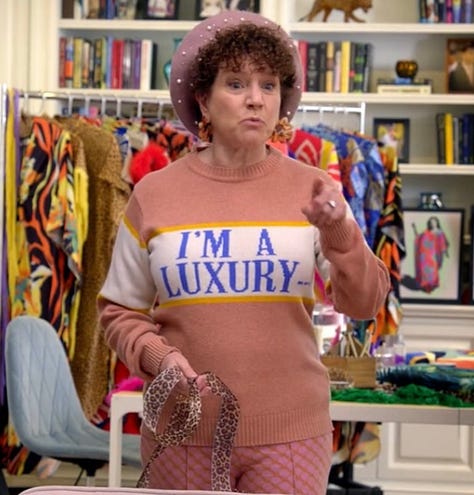
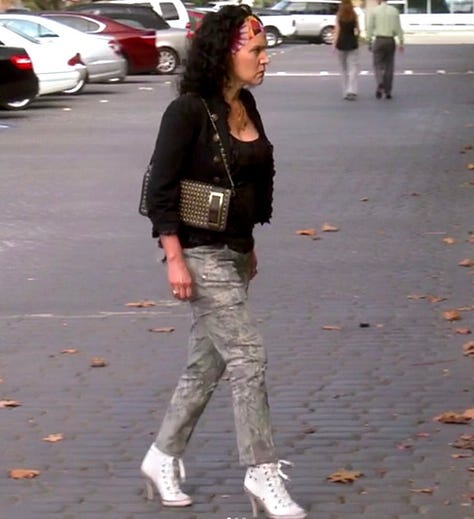

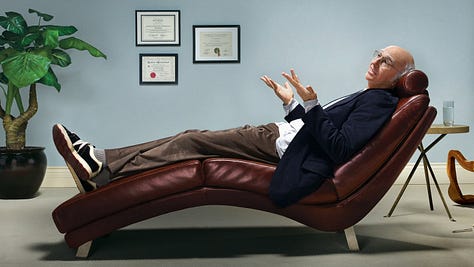

I believe the only true test for anything—be they human conditions, insect, birds or fish—is time. Any work that continues to captivate us after ten, twenty, or even thirty years transcends the opinions of any expert’s opinion. And perhaps using time as the main axis for one's life philosophy isn't a bad idea either— simple in concept, never easy in execution, although it does come with a free built-in bullshit detector. Maybe this is Larry David's wisdom: petty emotions, social conventions, the cutthroat world of capitalism, even religious ethics, all seem inconsequential when subjected to the passage of time. His declaration, "I have learned nothing," is perhaps the most honest reflection of life. Most films or television fall victims to the fallacy of linear growth of the character, good for a motivational speech, but falling short when faced with the depth and complexity of real life. Yet because Larry approaches every mundane and sublime with the same seriousness, everything becomes a big deal yet nothing is a big deal. Winning or losing is merely a game of chance, a toss of the coin, and even facing failure, there's no need to obsess over what lessons learned. And so, the ending of the final episode need not be overly sentimental, for "Curb Your Enthusiasm" was never about beginnings and endings, much like life itself—it just goes on, whether you like it or not.
In the past two days I've read many pieces about the finale of Curb, often equating Larry David to Emily Post, even a few titans of philosophers, but I’d rather think of him as philosophy, not a philosopher. If I were to choose between being a poet and a poem, I'd rather be a poem, much like Larry.
____________________________________________________________________________
LD
二人搭档里之于我心水的往往是相对“幕后”的那位,例如Munger而非Buffett, Woz而非Jobs, Lotta而非Demna, 当然就是之于Seinfeld的Larry David。
可能是因为长期居于幕后不会像做头把交椅的那位过于受名利的牵制而更容易讲真话。也有可能是因为甘心做右手的人是真的只对从第一天起的那个玩具跟发明有兴趣,十年二十年如一日,韬光养晦,哪怕旁边的一位越来越身不由己地迷上了那玩具周围的东西还有聚光灯。Teamwork的精髓其实从不是契合而是牺牲。
也因为这个原因两位里让我更喜欢的总是Larry David,有时在想这样的一种关系缘分更过的是我被选择而非我百里挑一,更确切地说是一种“我也就这样了,所以无非选择”的宿命。所以当昨晚最后一集的Curb Your Enthusiasm终于落幕时,我脑子里不停地在想这是怎么样的一个结局。
一部跨越24年的作品的确有太多的东西去回味,也几乎不可能有一篇文字来概括。第一季出来的时候我还在中国念初中,甚至连Larry David是谁都不知道,那时国内学英文的必备只有Friends。虽然我不同意Friends是Dumb Down版本的Seinfeld,但的确不是一个赛道内的比赛。最简单的例子,好多Seinfeld里的笑话我到现在都不知道如何翻译成信达雅的中文。好的笑话绝的就在于只是某个时间某个地点关于某些人的某些事,如果错过就是错过,任何过于用力地解释只会适得其反反而自己变成笑柄。而Curb至于Seinfeld就彷佛04年Undercover的溶解系列,高桥盾把长相相似的模特化妆成双生儿,但一个身着正常版,一个身着同样款式但似乎被硫酸烫过的Evil Twin。而Curb一直也给我感觉是Seinfeld的Evil Twin。

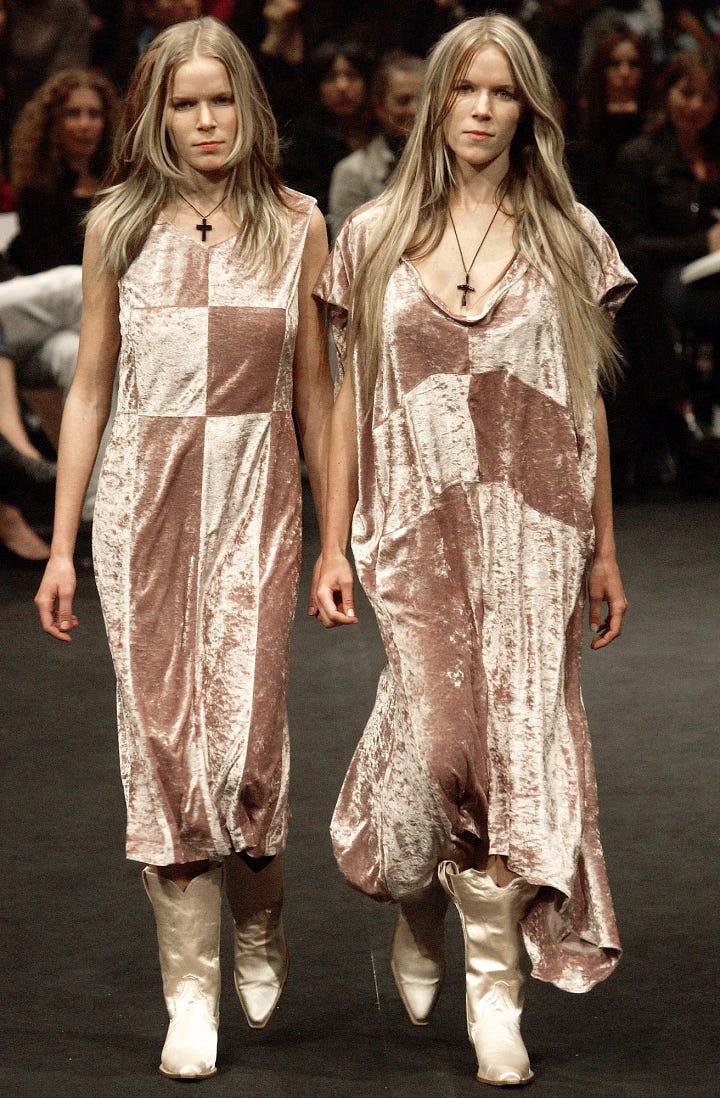

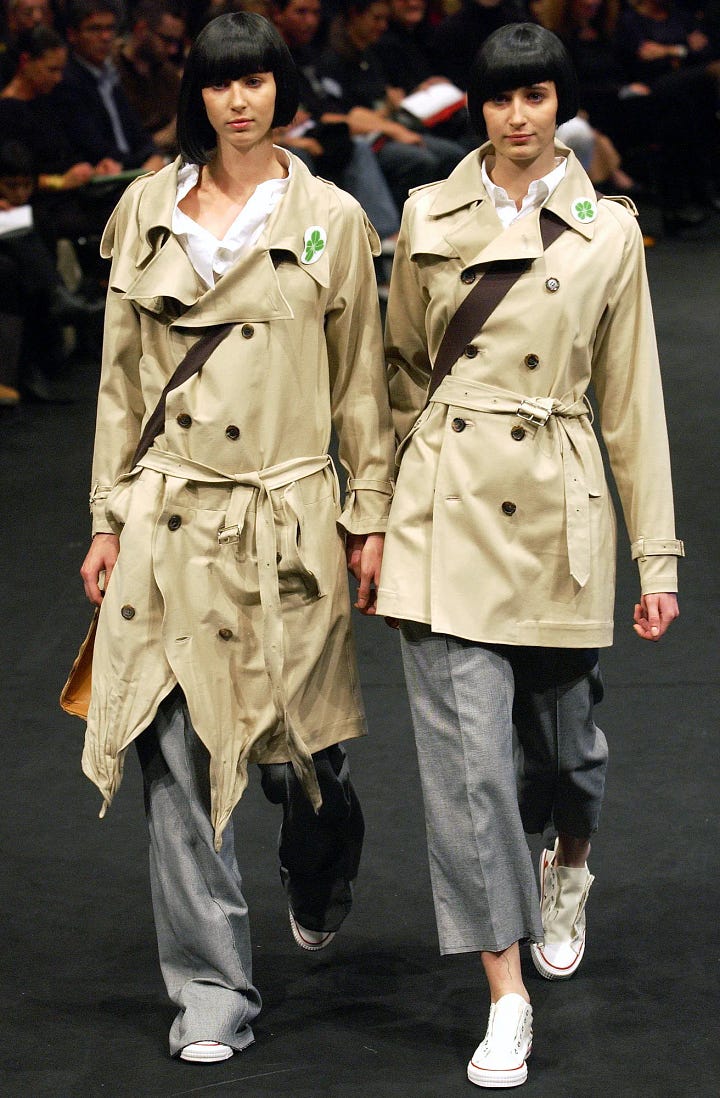
我有时在想当Larry做第一季的时候有没有想到20年之后还在拍这部似闹非闹存在于影视作品缝隙里的作品。24年的时间快到了Seinfeld的3倍长度,对于Jerry来说Seinfeld在从影视作品的角度来说最完美的时间结束-然无数人怀念跟惋惜。在Curb里Larry终于从幕后走到了前台,由George摇身一变更瘦身,更富有,从Jcrew转型到James Perse。也因为有了Fuck You Money的关系Curb里的Larry虽还是有很多George的尴尬但少了的是George的窝囊。因为很多问题发现原来金钱虽不能完全解决但至少可以润滑。
我不知道在一部电影一部剧的观众里能不能像百货公司那样有不同的会员级别制,但如果像我这样每一级至少看过10到20遍,并且夜夜伴你入眠的毕竟是少数,也自然看到一些只是看一两遍却品不到的味道。
既然这是一个关于时装(起码表面上)的Newsletter,这里不能不提Curb的服装,不仅仅是他自己的衣着,更是所有角色的的穿着搭配。一个是审美;一个是世界观。12季的朝朝夕夕似乎唯一不变的就是Larry:同样的发型与Olive People的MP-3眼镜,略窄却不过窄的Chino跟Soft Shoulder的Blazer,还有那双永不变的Simple Shoes。第一季的他似乎比所有人都老,而12季之后他却成了最年轻的一位。不知道Larry有没有看过金庸,因为他深知高手过招点到即止,从不过于地解释,因为那是业余者的地盘。就像Susie的John Varvatos与Fiorucchi(说到这里不得不提Essman最近的Marc Jacobs的广告大片,是我看到这几年最有创意的一部),Leon的Urban Outfitters到JW Anderson, 还有我个人的最爱Richard Lewis(我总觉得他没有走一趟Yohji Yamamoto的秀实在可惜)。这些就像是Curb的音乐选择一样虽从不喧宾夺主但每个音符都如手术刀般的精确,并且恰到好处。好品味也好坏品味也罢,其实又有谁能一锅端地决定呢,在我们指点评论各种角色同时揭露地更多的是自己。
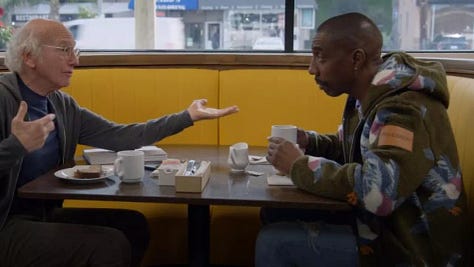

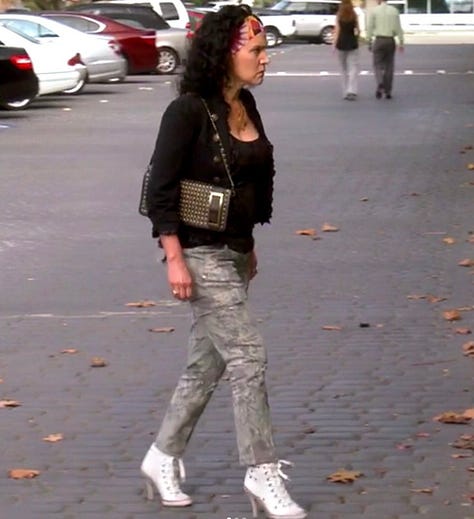
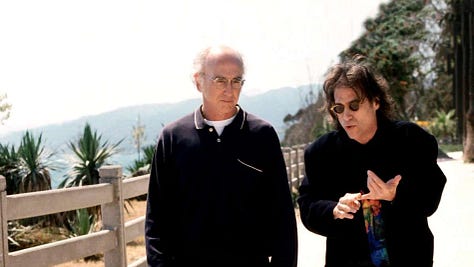


我认为唯一能考验任何人事风情飞鸟虫鱼的就是时间,所以任何一部作品能在十年二十年甚至三十年还能让我们津津乐道的早已超越了任何一个专家评审团的票选意见。而且一时间考验为轴心作为一个life philosophy也是一个不错的选择,虽不容易到却简单明了,并且免费赠送功能极强的bullshit detector。或许这也是Larry David的处世智慧吧:琐碎的情感,被生产出来的社交礼节,资本竞技里的你争我斗,甚至宗教伦理,放在时间的熬煮里似乎没有什么是严重到不可以收场的事情。这样下来他的那句“I have learned nothing”何尝又不是生活最真实的写照呢?电影也好电视也罢似乎没有人能摆脱这种“N”行的线性成长,当motivational speech还不错但缺乏生活的深度与复杂。正因为他对所有的大事琐碎都一如严肃专一,反而没有什么事情是克服不了,输赢也是丢钱币的机遇游戏,即便是输了也不一定要问这次失败学到的啥。也正因如此最后一集的结束也没有必要过多的伤感,因为Curb Your Enthusiasm这部剧从来就没有开始与结束,就像现实生活一样,就算闷了也要继续。
今天看到的大多数文章好多把Larry David比做Emily Post跟各种Philosophy King,我觉得与其说他是一个哲学家倒不如说他是一部哲学命题,若能在诗人跟诗中选择我应该跟Larry一样宁愿作首诗。



